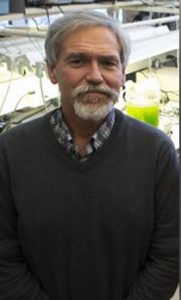A new project will be kicking off with partners Rochester Institute of Technology and Synergy Biogas to explore using microalgae to make biofuels as well as clean agricultural wastewater. The pilot program is headed up by Jeff Lodge, associate professor in RIT’s Thomas Gosnell School of Life Sciences, who will be utilizing a anaerobic digester located on Synergy Farms in Covington, New York to grow microalgae on digested biomass. The goal of the summer project is to study how the microalgae consumes contaminants in wastewater and produces algal biomass. Lodge will then take the resulting feedstock and covert it to renewable energy in the form of biofuels.
 Lodge will grow the microalgae in a 1,000-gallon tank at Synergy in a process that can be scaled up to treat 52,000 gallons, or 200,000 liters, of wastewater a day. The trial project will study the organisms’ ability to consume ammonia, phosphorous and nitrogen from digested biomass and reduce contaminants below state-mandated levels. Lodge’s past laboratory experiments with microalgae have reduced phosphorous in wastewater by greater than 90 percent to levels of 0.1 parts per million, exceeding the required 1 parts per million in New York.
Lodge will grow the microalgae in a 1,000-gallon tank at Synergy in a process that can be scaled up to treat 52,000 gallons, or 200,000 liters, of wastewater a day. The trial project will study the organisms’ ability to consume ammonia, phosphorous and nitrogen from digested biomass and reduce contaminants below state-mandated levels. Lodge’s past laboratory experiments with microalgae have reduced phosphorous in wastewater by greater than 90 percent to levels of 0.1 parts per million, exceeding the required 1 parts per million in New York.
“My research lab has moved from small scale laboratory experiments demonstrating the significant reduction in ammonia, nitrate, phosphate and coliforms in municipal wastewater to larger scale experiments both in the lab and onsite at wastewater treatment plants,” Lodge said.
With agricultural runoff a growing concern, the project has the ability to identify a feasible solution to reduce phosphorous and other contaminants from the resulting liquid fertilizer to mitigate the impact of runnoff into streams and rivers.
“We are truly excited about the opportunity to work with RIT on this innovative approach—it could be a game-changer toward reducing phosphorous loads—which would go a long way towards keeping the Great Lakes free of algae blooms,” said Lauren Toretta, president of CH4 Biogas, parent company of Synergy Biogas. “It increases the overall environmental benefit.”
The research team will also isolate lipids from the remaining algal biomass to make biodiesel and carbohydrates to produce bioethanol through yeast fermentations. Finally, the remaining biomass after this process will be added to the anaerobic digester as a co-substrate or will be used as a fertilizer.

